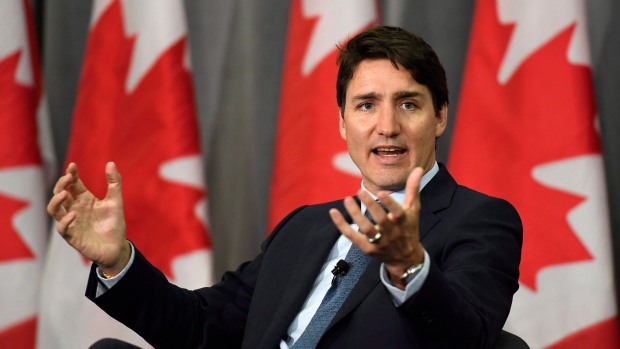Pundits, commentators and members of political panels love trends. Trends are great. Give us a trend and we can write (or talk) for hours. And here’s a secret: the official definition of a trend in news land is anything that tops a coincidence: i.e. anything that comes in a minimum of three. Twice is a coincidence. Three is a trend.
Here’s a trend that might have cause to worry Justin Trudeau and his handlers. Fresh from the triumph of keeping NAFTA largely as it was and winning the undying friendship of Donald Trump (which should last ’til Thursday, maximum), the Liberals have been feeling their oats. The prime minister got all feisty in Parliament, calling the Conservatives a bunch of “ambulance chasers” because they were upset at the kid-glove treatment of a vicious child killer. Trudeau may have overstepped himself in this, given that even many urban Liberals were pretty appalled at the horrific murder of Tori Stafford and feel her killer should be treated as one.
But that’s not where the trend lies. It lies in incumbency, and the insecurity thereof. If you examine the most recent elections in Canada, both federal and provincial, you quickly notice that voters have taken a liking to ousting the incumbent.
If you examine the most recent elections in Canada, both federal and provincial, you quickly notice that voters have taken a liking to ousting the incumbent
In British Columbia, the Liberals were ousted in favour of the New Democrats and some Green facilitators. Alberta’s Progressive Conservative dynasty tumbled to Rachel Notley’s NDP, and Notley appears very likely to be tumbled in turn by Jason Kenney’s reborn Tories. Manitoba dumped the NDP for the Conservatives; Ontario reduced the Liberals to a garage band in favour of Doug Ford’s PCs; Quebec learned to love something other than a Liberal or Parti Québécois government, and New Brunswick gave Conservatives more seats than the ruling Liberals, though Premier Brian Gallant is still desperately trying to hang on (possibly because he’s never wanted to be anything but a politician in his life and can’t face the alternative). In Newfoundland, Liberal Dwight Ball put the PCs and their revolving-door leadership out of its misery.

The outliers are Nova Scotia, where the Liberals saw their majority sharply reduced but retained power, and Prince Edward Island, where there are so few voters a traffic jam can throw the result, but where both the Liberals and Tories lost ground to Greens and the NDP. Oh, and Saskatchewan, where everyone just seems to be perennially pleased as punch with their Saskatchewan party government. Brad Wall, Scott Moe — who cares, they’re happy!
It’s clearly not a positive scenario for the federal Liberals, who gained office themselves by defeating a Conservative government that was getting long in the tooth. Longevity may have a lot to do with the recent turnover in incumbents. In B.C., Alberta, Manitoba, Ontario and Quebec, the defeated party had held office for the better part of a decade or more, and done much to wear out its welcome.
It’s clearly not a positive scenario for the federal Liberals, who gained office themselves by defeating a Conservative government that was getting long in the tooth
Yet it also betrays no sign that Trudeau’s three years in office have produced a national yearning for more Liberals. The Quebec party’s share of the vote was its worst since Confederation. Ontario’s Liberals won the fewest seats in their history: even when the legislature was far smaller, and during the long PC hegemony of the mid-20th century, the party never fell as low as seven seats. In both Alberta and B.C. voters moved further left, but the two NDP governments are now at each other’s throats, and Notley’s run as premier could well inspire the start of a new conservative winning streak.

There’s no real sign that Canadians are feeling as rattled and rebellious as the Britons who voted for Brexit or the Americans who elected Donald Trump. Nor is there any hint of serious support for extremist entities on the left or right like those that have unsettled governments in Sweden, Germany and France, or edged Italy even closer to being ungovernable. The provincial results suggest Canadians aren’t looking for a revolution, but answers to pragmatic matters that have gone on too long without remedy: a deep plunge into debt that saps revenue from social essentials; the sense of sharp divisions between generations, regions, prospects and prosperity; the failure to agree on a reasonable balance between protection for the environment and a healthy economy. Worries about the future abound, especially given Canada’s vulnerability to international influences and the stark changes going on beyond our borders.
The Liberals are vulnerable on those fronts. The concerns that got Ford, John Horgan and François Legault elected in Ontario, B.C. and Quebec reflect a feeling that local concerns aren’t being met. Trudeau had a great friend in former premier Kathleen Wynne but will have a determined critic in Ford. Legault is likely to be far more willing to challenge Ottawa than outgoing Premier Philippe Couillard. His hard line on immigration is a recipe for confrontation.
Across the prairies and the West Trudeau’s stab at making friends has failed. Kenney, Moe and Ford launched a united front last week against the federal carbon tax plan, while Manitoba’s Premier Brian Pallister abruptly cancelledhis government’s support for the plan, as, earlier, did Notley. Tory strength and popularity in those regions, if it holds, could be a great boost for federal opposition leader Andrew Scheer’s struggle to crack Canadian consciousness.
The next federal election is 54 weeks away and the prime minister needs something to inspire his supporters. Slogans like “We brought legal marijuana to your neighbourhood,” and “The trade deal could have been worse” may not cut it. In 2015 he promised a “true partnership” with the provinces. That hasn’t happened. He may be lucky this time around just to avoid an outbreak of open hostilities.
National Post

























